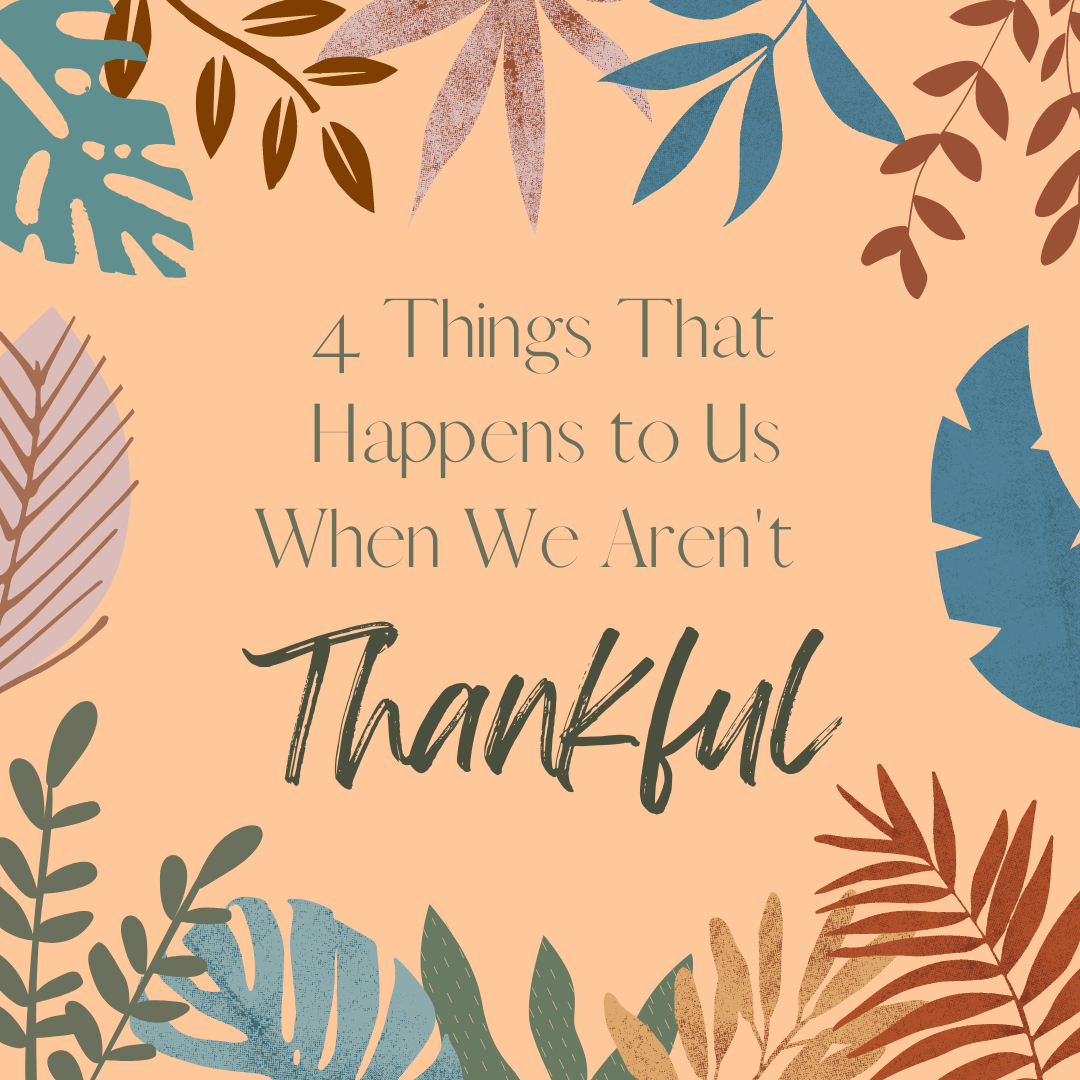Every November we can count on it: media outlets bombard us with reminders of why thankfulness is good for us. Giving thanks will make you happier, they say. Healthier. It will change your outlook and usher in peace.
And, they are right.
Still, knowing all the benefits of thankfulness isn’t sufficient motivation for most of us to practice thankfulness past the perfunctory, “name one thing you’re thankful for while you pass the potatoes, please” ritual we practice on Thanksgiving.
If we’re being completely transparent, most of us express gratitude on a day, but not on the daily.
But is it really a big deal if we aren’t thankful the other 364 days of the year?
Here are four things that happen to us when we are NOT thankful:
4 Things That Happen to Us When We Aren’t Thankful:
-
We Become Preoccupied with Self
In Luke 17 ten lepers call out to Jesus, “Heal us!” In compassion, Jesus tells them to go show themselves to the priest and on their way, they’ll be healed. And they are! Only one, however, goes back to say, “thank you.” Although math isn’t my strong suit, even I can calculate the percentage here.
Weren’t all ten happy they were healed? Didn’t all ten get what they wanted?
Of course.
However, getting what we want doesn’t always translate into thankfulness.
Why is this important to note?
Because happiness is self-focused (Do I feel good? Am I pleased with the way things turned out? Did I get my way?). Thankfulness, though, forces us to look beyond ourselves.
We live in a world where preoccupation with self is epidemic–and it’s making us miserable. Thankfulness is the antidote to the poison of self-preoccupation.
-
We Become Entitled
It’s a short walk from being self-preoccupied to being entitled. Entitled people aren’t thankful because they see blessings not as welcome gifts but as deserved rights.
Why would anyone be thankful for something they believe they’re entitled to in the first place? They won’t.
What’s more, entitlement produces selfishness. In the back of their minds, an entitled person thinks, what’s in it for me? As a result, they are rarely generous, and when they are, their generosity comes with strings attached.
This is as true for kids and teens as it is for adults.
What’s the antidote to entitlement?
Regularly expresses gratitude and thanks.
-
We Become Joyless at Best, Bitter or Resentful at Worst
When we fail to pause long enough to give thanks our senses become dull. We see life in shades of grey rather than in vivid colors. Soon, rather than moving through life with joy and zest, we move through life with resentment and dread.
It’s easy to think, I’ll be thankful when I have something to be thankful about. After all, when life is hard, what’s there to be grateful for anyway?
But, the most necessary time to give thanks is when it’s least natural to give thanks.
[bctt tweet=”The most necessary time to give thanks is when it’s least natural to give thanks. ” username=””]Yes, this takes intentionality. But it’s worth it.
As we’ve just seen, happiness doesn’t automatically translate into giving thanks, but giving thanks translates into happiness, peace, contentment, and joy.
Perhaps this is one reason why giving thanks is God’s will for us. “Give thanks in all circumstances; for this is God’s will for you in Christ Jesus.” (1 Thessalonians 5:18).
God doesn’t demand that we give thanks for all circumstances; God instructs us to give thanks in all circumstances.
I used to think giving thanks was for God’s benefit; now I’m convinced it’s for mine.
Recent studies confirm that the act of thankfulness changes the chemistry in our brain, making us happier, healthier people.
“The practice of gratitude increases your dopamine and serotonin production (“feel good” hormones) which encourages your brain to seek more of the same. It’s the brain saying, ‘Oh, do that again’ which means the more you are grateful for, the more you will find to be grateful for.”
When we give thanks IN circumstances, an attitude shift happens IN us.
But, the reverse is also true. When we don’t give thanks a different kind of attitude shift occurs–one that leads to hopelessness, depression, bitterness, and resentment.
-
We Take God for Granted
James 1:17 tells us that “every perfect gift is from above coming down from the Father of lights, in whom there is no change of shifting of shadows.” This means every good thing you or I possess—life, breath, salvation, forgiveness, love, community, truth, grace, beauty, creation, family, friends (and the list could go on) is all God’s way of saying, “Here, I want you to have this because I love you.”
If you’ve ever spent time and money searching for the perfect gift but the recipient mumbled an insincere, “thanks” as they tossed it aside, you know what it feels like to be taken for granted.
When we fail to notice and thank God for our blessings–the big ones and the little ones–we take God for granted. When we take God and His blessings for granted, eventually we’ll fail to notice or care about God at all.
What Happens When We Give Thanks?
The Act of our Will Becomes an Act of Worship
King David wrote,
“I will give thanks to you, Lord, with all my heart;
I will tell of all your wonderful deeds.” (Psalm 9:1)
Did you notice David said, “I will give thanks”?
Giving thanks is a choice. Gratitude is a decision. Thankfulness is intentional. We either choose to thank God or we will forget to thank God.
What happens when we choose gratitude is nothing short of life-changing. Thankfulness produces joy, peace, generosity, unselfishness, zest for life, and zeal for God.
Thankfulness is a path to please God and it’s the path to holy pleasure.
So here’s the challenge: Each night before you lay your head down on your pillow, tell God thank you for three things that went well that day. No matter how difficult life can be (and for some, life is really hard right now) this simple practice will keep us from being ungrateful people and move us toward the One who never leaves us or forsakes us, and from whom all blessing flow.
You are loved,
Donna
P.S. You are one of my blessings! I want to say a heartfelt “thank you” for connecting with me here. May God bless you from the top of your head to the tip of your toes. And may you live knowing you are fully and completely loved.
P.S.S. I’d love to connect with you over on Instagram @donnaajones. On the “That’s Just What I Needed” podcast this month I’ve had some wonderful guests (check out the “Things I Wish I’d Known Sooner” episode with author, Danna Demetre). I also have an episode where I share personal wisdom about how to make a relationship better, and there’s even an episode where I explain Holy Spirit. I hope you’ll listen to at least one episode and it will be just what you needed!



